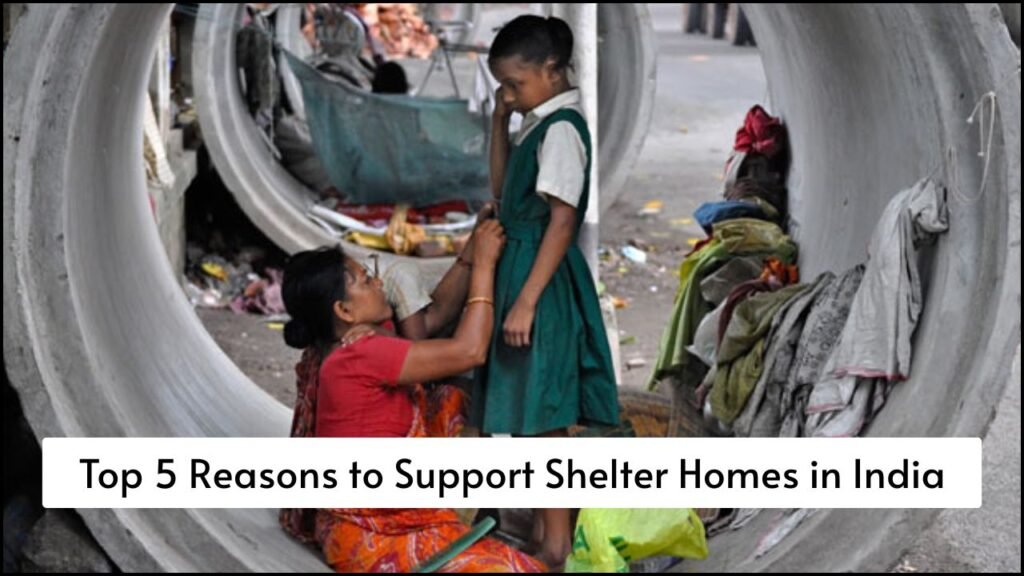
Shelter homes in India play a vital role in offering safety, care, and dignity to those who have no place to call home. These institutions support not only abandoned children and elderly people but also abused women, disabled individuals, and those affected by disasters. Support for shelter homes is not just a matter of charity—it is a necessity for social justice and national development. The following sections explain the top five specific and original reasons why supporting shelter homes in India is essential.
1. Protection for Vulnerable Populations
- Shelter homes protect people who are at high risk due to poverty, abandonment, abuse, or disability.
- Children, especially orphans and runaways, find a secure place where they are protected from trafficking, child labor, and exploitation.
- Women fleeing domestic violence or abuse receive legal aid, emotional support, and safe lodging.
- Elderly people who have been neglected or left alone get food, medical care, and emotional companionship.
Examples of Vulnerable Groups and Their Needs
| Group | Common Issues | Support Provided by Shelter Homes |
|---|---|---|
| Children | Abandonment, trafficking | Education, healthcare, safety, food |
| Women | Domestic violence, assault | Legal support, counseling, shelter |
| Elderly | Neglect, poor health | Medical care, housing, community interaction |
| Disabled | Discrimination, unemployment | Mobility aids, skill training, care services |
| Disaster Victims | Homelessness, trauma | Medical care, housing, and community interaction |
2. Rehabilitation Through Education and Skills
- Shelter homes are not limited to offering beds and food; they also focus on long-term rehabilitation.
- Vocational training helps residents build skills in tailoring, crafts, agriculture, IT, and more.
- Formal education is often provided for children, helping them re-enter mainstream schools or take exams privately.
- Job placement programs empower youth and women to become financially independent.
Education and Skill-Based Initiatives in Shelter Homes
| Program Type | Offered Skills or Courses | Target Beneficiaries |
|---|---|---|
| Basic Education | Literacy, numeracy | Children, young adults |
| Vocational Training | Tailoring, beautician, data entry | Women, youth |
| Computer Courses | Typing, basic coding, MS Office | Teens, job-seekers |
| Workshops | Life skills, communication skills | All age groups |
3. Contribution to Crime Reduction
- Shelter homes help lower the risk of crimes by keeping at-risk individuals off the streets.
- Street children, when not guided, often fall into petty crimes, drug use, or begging mafias.
- Homeless people, when neglected, may become victims or unwilling participants in unlawful activities.
- Rehabilitation programs in shelter homes redirect them towards education and jobs.
Impact on Crime Prevention
| Group at Risk | Potential Crime Involvement | How Shelter Homes Help |
|---|---|---|
| Street Children | Theft, gang activity | Provide education, stability |
| Abused Women | Forced crimes, blackmail | Offer legal aid, psychological help |
| Homeless Youth | Drug dealing, violence | Guide to employment, rehabilitation |
| Abandoned Seniors | Victims of fraud, neglect | Offer safety, healthcare, and companionship |
4. Encouragement of Social Responsibility
- Support for shelter homes fosters a sense of social responsibility and empathy within society.
- Volunteers, donors, and professionals who engage with shelter homes develop a deeper understanding of social inequality.
- Community participation is encouraged through awareness programs, donation drives, and local partnerships.
- Youth groups and students often gain real-world exposure and values through internships and service.
Social Benefits of Supporting Shelter Homes
| Stakeholder | Role in Shelter Homes | Impact on Society |
|---|---|---|
| Volunteers | Teaching, helping with activities | Builds empathy, civic responsibility |
| NGOs & Donors | Funding, food, and medical supplies | Sustains operations, creates partnerships |
| Schools & Colleges | Internships, awareness drives | Spreads awareness, engages youth |
| Local Communities | Organizing events, celebrations | Builds inclusive, compassionate societies |
5. Improvement of Public Health and Well-Being
- Shelter homes offer access to basic healthcare, hygiene, and mental health support.
- Routine checkups, vaccinations, and access to medicines prevent the spread of diseases.
- Counseling services help people cope with trauma, stress, or addiction issues.
- Special needs individuals receive custom care and therapy sessions.
Health Services in Shelter Homes
| Health Concern | Service Provided | Target Beneficiaries |
|---|---|---|
| Malnutrition | Regular meals, supplements | Children, the elderly |
| Physical Illnesses | Doctor visits, medicines | All residents |
| Mental Health | Therapy, group counseling | Abuse survivors, orphans |
| Disability Support | Physiotherapy, assistive equipment | Physically challenged individuals |
| Hygiene and Sanitation | Clean bathrooms, clean clothing | General shelter population |
Summing Up
Support for shelter homes in India is not just an act of generosity—it is a strong step toward creating a fair, healthy, and inclusive society. Each rupee, each hour of volunteer work, and each shared resource contributes to protecting lives, restoring dignity, and building futures. Collective efforts toward sustaining and strengthening shelter homes will lead India closer to a just and humane society.









